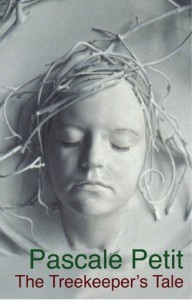Helen Lowe's Blog, page 316
November 29, 2010
Tuesday Poem: "Blue" by Catherine Fitchett
Blue
In the first week
the sea is the dark blue of the mountains
between the blooming heather and the first snowfall.
In the second week
the sea is the greyish blue of her Sunday best sateen
which she wore when they first met.
In the fifth week
there are storms. White waves crash on the deck.
Through her porthole she sees a sea as green-blue as his eyes
that caught her gaze when he asked for her hand in marriage.
In the eighth week
her child sickens.
they are becalmed in the turquoise blue of the bracelet
on her sister's arm, waving at the dockside.
In the ninth week
the days grow shorter. At twilight
the sea is the inky blue of the words in her diary,
recording births, deaths and distance travelled.
In the last week
they bury her child. The ship is enclosed by sea and sky
the blue of the eggshell she found on the path to the byre.
Nearby an unfledged chick with staring eyes,
covered in flies.
The next week she unpacks seeds brought from home,
plants cabbages and carrots,
marigolds, poppies and nasturtiums.
The cornflower seed, she sets aside.
In summer the garden is aflame
with red, orange and yellow
but no blue
not any scrap of blue.
(c) Catherine Fitchett
Published in Flap: The Chook Book 2, (The Hen House) 2010
—
About the Poem:
This is another Tuesday Poem selection from the recently released Flap: The Chook Book 2 by Christchurch poets Victoria Broome, Catherine Fitchett, Barbara McCartney and Christina Stachurski. Blue is from Catherine's section of the anthology: as strong as eggshells. I am a great admirer of Catherine's poetry and have liked Blue since Catherine frst read it at a Canterbury Poets' Collective reading at Madras Cafe Bookshop a few years back.
About Catherine:
Catherine Fitchett grew up in Wellington, where she did some writing in high school but studied chemistry at university. She has had several careers as a forensic scientist/toxicologist, full time mother of five, and currently works in the accounting field. Catherine's varied interests have included quiltmaking and genealogy as well as poetry, which she returned to writing after attending a Canterbury University summer school course with Bernadette Hall in 1999. She is now a member of the small poetry group, The Poetry Chooks, which formed shortly after. The group have two collections published, The Chook Book, and the recently released Flap, The Chook Book 2.
—
To read the featured poem on the Tuesday Poem Blog—and link to other Tuesday Poets posting around NZ and the world—either click here or on the Quill icon in the sidebar.
November 28, 2010
Steampunk Reprised
On November 18 I discussed whether steampunk was the next genre wave and Joff's comment included a link to a blogpost by Charles Stross, critiquing the subgenre.
Leviathan author Scott Westerfeld riposted with the following post (interestingly titled "Genre Cooties!"):
" … But then I come home to discover that the internet got stupid while I was gone. And not just regular internet stupid about cats or politics, but stupid about steampunk!
Perhaps the prime example is this post from the normally incisive Charles Stross, surely the most banal thing he's ever typed. I mean, pointing out that the Victorian era was imperialistic? Racist? Sexist? Had lousy labor laws and no class mobility? Like no one in the steampunk world was considering this?
News flash: the online world of steampunk is constantly engaged in exactly those issues …"
The rest of Westerfeld's post is here.
So what do you think? Are you in Camp Stross or Camp Westerfeld? For steampunk or against? Or bivouacked somewhere in no-man's-land?
November 27, 2010
Thanksgiving
Thursday 25 was Thanksgiving Day in the US, but the long weekend continues through until today, Sunday 28. Thanksgiving isn't a festival that we celebrate in NZ at all and I know there's also a strong historical context for the holiday in the US, around the early pilgrim settlers and the food they received from the North American Indian people which helped them survive.
So, a particularly American story—but I do think the idea of a festival around "taking stock" and celebrating just "being here" is a really good idea. In many ways that process is part of New Year, but an aspect that gets a little lost in the "big party" celebration that has become our tradition—at least here in New Zealand. And of course, because our New Year falls in the middle of summer, rather than winter, the weather encourages the big party as opposed to reflection and drawing close around a fire with family and friends.
Like many people in NZ this week, the Pike River mining tragedy has put me more into that reflective frame of mind—not just thinking about how terrible this time must be for the families and friends of the 29 men who died, but also making me more appreciative of my own "fortunate life", even if some of that good fortune sometimes seems very everyday and easily overlooked.
Very simple things: like sunshine; the intense green of leaves and the way the sun edges them with light, and the blue of the sky; taking a few moments to sit on the back step with my little cat buddy, who has various names but has been a buddy for 18 years now; having a back step to sit on that is more or less intact, following the September 4 Christchurch earthquake and its aftermath; not just having enough to eat, every day—which so many people in the world don't—but food that I enjoy as well; music to listen to; books to read … And always the big stuff: partner, family, friends—and the rare and wonderful privilege of being able to string words into poems and stories, some of which have found their way into the world as books.
Big things; little things—but all well worth that moment of appreciation, of consciously giving thanks.
November 26, 2010
2010 Reads: My Personal Picks So Far
It's not the end of the year yet, but reading Christchurch City Libraries' top picks yesterday made me think about the books that have been standout reads for me so far this year. I read a huge number of books so to qualify a book really needs to standout in retrospect as well as being something I enjoy while reading. (That's a much bigger list and needless to say there's some very good books on it.) So here's my top 6 picks so far, in alphabetical order by author:
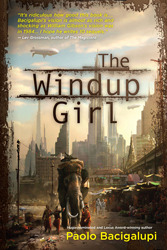 The Windup Girl by Paolo Bacigalupi — medium-future dystopian scifi that really hooked me in from the opening sequence
The Windup Girl by Paolo Bacigalupi — medium-future dystopian scifi that really hooked me in from the opening sequence
—
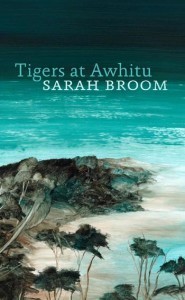 Tigers at Awhitu by Sarah Broom — this accomplished and moving debut poetry collection made a great reading start to my year.
Tigers at Awhitu by Sarah Broom — this accomplished and moving debut poetry collection made a great reading start to my year.
—
 Room by Emma Donoghue — a Booker shortlisted novel I didn't expect to enjoy from the back cover, but by the end of Chapter 2 I didn't want to put it down.
Room by Emma Donoghue — a Booker shortlisted novel I didn't expect to enjoy from the back cover, but by the end of Chapter 2 I didn't want to put it down.
—
The Treekeeper's Tale by Pascale Petit — powerful poetry from celebrated UK poet, Pascale Petit, covering themes of nature and archaeology.
—
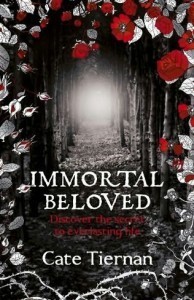 Immortal Beloved by Cate Tiernan — a YA paranormal urban fantasy that is not about vampires (despite the title.) I really enjoyed the characters and Tiernan's use of (real) history in the backstory.
Immortal Beloved by Cate Tiernan — a YA paranormal urban fantasy that is not about vampires (despite the title.) I really enjoyed the characters and Tiernan's use of (real) history in the backstory.
—
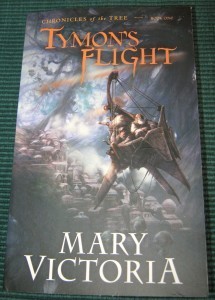 Tymon's Flight by Mary Victoria — I love the concept of the "world tree" and the steampunk overtones with dirigibles and flying machines.
Tymon's Flight by Mary Victoria — I love the concept of the "world tree" and the steampunk overtones with dirigibles and flying machines.
November 25, 2010
Christchurch City Libraries: "Heir" Included in Best Reads of 2010!
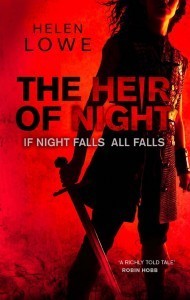
AU/NZ Cover
Fellow SpecFicNZ-er Wen Baragrey drew the following link to my attention yesterday, i.e. that Christchurch City Libraries' staff have recently published their "Top Reads" for 2010 and Megan has included The Heir of Night amongst the picks, here. (Scroll down to see "Megan's Top Three".)
Re Megan's "can't wait" for the rest of the quartet (thank you, Megan!) I can put my hand on my heart and undertake that I am working very hard to get Book Two out there as soon as may be! 
November 24, 2010
Pike River Mine Deaths
Yesterday 29 men were confirmed dead in the explosion that occurred at Pike River underground mine on the West Coast, in what is being described as New Zealand's worst peacetime loss of life since an Air New Zealand DC10 crashed on Mt Erebus in Antarctica, in 1979.
Although both a novelist and a poet, at times like these I feel there are no words that can readily and respectfully encompass the grief and loss of the families and friends of the men who have died, or the blow to the community. But I do wish to acknowledge the magnitude of the disaster that has occured and extend my very deep sympathy to the families and to the Greymouth and West Coast communities.
November 23, 2010
New Publications: "JAAM 28: Dance Dance Dance" and "Bravado 20″
Although finishing The Wall of Night Book Two is definitely centre stage right now, I do have a couple of new poems out there in the world.
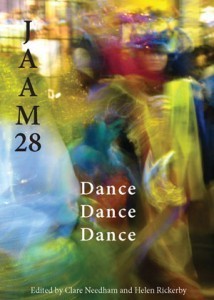 JAAM 28: Dance Dance Dance edited by Clare Needham and Helen Rickerby* has just been published and contains two of my poems: Giacometti and Oral History. To find out more about JAAM, click here, and the Dance Dance Dance edition is here.
JAAM 28: Dance Dance Dance edited by Clare Needham and Helen Rickerby* has just been published and contains two of my poems: Giacometti and Oral History. To find out more about JAAM, click here, and the Dance Dance Dance edition is here.
(* By the way, when you visit Helen Rickerby's website, I particularly recommend her poem, Empress Elisabeth.)
—
Bravado 20 has also recently been published and includes my poem Notice to Quit.
Sadly—and I've just realised that the title of my poem might be construed as prophetic!—this is the final issue from the Bravado team, who have given us six years of bravura literary publication and a wonderful annual poetry competition. I know that I have been privileged to have several poems and short stories published in Bravado and feel, as I know many other poets and writers do, that the departure of the journal leaves a definite "gap."
But I know anyone involved in writing, or with experience of journal publication, understands the huge commitment of personal time and energy that editing and production take, and why the team at Bravado have decided to call it quits. I do wish them all well for their future endeavours.
November 22, 2010
Tuesday Poem: "Wonderful To Relate" by Michele Leggott
Wonderful To Relate
my brother leaves a message call me
something has happened is it an emergency
or terra incognita waving about in the trees
closer than anyone imagined a daughter
he says when I call him back I have a daughter
and she is twenty-seven years old
this takes a bit of explaining and when
he has I ask is there a photo did you take
some photos the files arrive as we talk
I open them and there she is someone
who looks like all of us and is most surely
herself the stranger who is his daughter
our niece and now eldest of five cousins
it takes a long time to work out
the delicate shapes that might be and when
it is done she comes to meet us
more photos more talk we have given her
our grandmother's rings she gives us
the gift of herself if we will have her
that part is easy and now there's
a wedding in the air they will tie the knot
with his people and we will travel again
to Te Matau a Maui this time
with everyone on board and in a vineyard
at the far end of summer with strangers
who have made us welcome my brother
will give away his daughter knowing
she has made us into something bigger
and more precious than anyone
could have imagined she is herself
and she is one of us for her
we will travel the miles to Haumoana
looking at the windy sea thinking about
long ago family weddings and how this one
is adding its quota of surprises
and serendipity to the story we thought
we knew mirabile dictu we say
wiping away a sneaky tear such wonders
and everybody talking we are here
with a million champagne bubbles
bursting miraculously against our lips
wish us well we are going to a wedding
(c) Michele Leggott
Published in Mirabile Dictu (Auckalnd University Press) 2009
—
About the Poem
Michele Leggott's Mirabile Dictu was one of my favourite poetry collections from last year and this poem, which is not the title poem, but close—its title a translation of the book title—is one of my favourites from the collection. Often within a collection, and often found near the end of the manuscript, will be a poem that you feel, as a reader, in some way encapsulates the whole or acts as a key to unlock it. For me, wonderful to relate is that key: a poem of wonders in a collection of wonderful poetry.
wonderful to relate has also been featured by Phantom Bill Stickers for their poster poetry series distributed in both New Zealand and the USA.
—
About Michele Leggott:
Michele Leggott is a Professor of English at The University of Auckland, an award-winning poet, literary scholar and the founding director of the NZ Electronic Poetry Centre. For more about Michele and Mirabile Dictu visit here (& scroll down.)
—
To read the featured poem on the Tuesday Poem Blog—and link to other Tuesday Poets posting around NZ and the world—either click here or on the Quill icon in the sidebar.
November 21, 2010
What I'm Reading: "Ship Breaker" by Paolo Bacigalupi
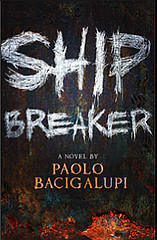 Last week, while up in Auckland, a few people praised Paolo Bacigalupi's new YA novel, Ship Breaker, to me.
Last week, while up in Auckland, a few people praised Paolo Bacigalupi's new YA novel, Ship Breaker, to me.
As you may recall from earlier in the year and from my guest posts on the Hugo Award fiction finalists on Out of this Eos, I loved Bacigalupi's The Windup Girl—and in fact it was my pick to win the Hugo Award for Best Novel this year. (In the end, the Hugo was shared by The Windup Girl and China Mieville's The City & the City, my second choice.)
So I was really pleased to get a copy of Ship Breaker and began it while on holiday, but have been finishing it over the rest of the intervening week.
Do I love it as much as I loved The Windup Girl? Not quite—but I still like it a lot. Both books are dystopian science fiction set in a medium-future world where the end of oil (is "peak oil" the right phrase?) and climate change have wreaked their havoc. Bacigalupi's vision of that world is as well-realized and compelling in Ship Breaker as it is in The Windup Girl—and I enjoyed the future technology vision of the clipper ships, juxtaposed with the brutality and grunge of the ship breaking community and post climate change "Orleans."
The Ship Breaker plot includes a little piratical action thrown in with the dystopian realism—perhaps not quite swashbuckling, but close—which gives the story a "lift" that I think teens (and readers of all ages) will enjoy. And I personally found the dystopian storytelling more realistic than in Patrick Ness's The Knife of Never Letting-Go—which I enjoyed for other reasons, but found some plot elements just a tad implausible.
As with The Windup Girl though, it is the characters that make the Ship Breaker story: the boy Nailer and his relationship with his violent, drug addicted father; his friendship with Pima, a fellow "Light Crew" ship breaker and her mother, "Heavy Crew" Sadna, and the advent in their lives of the clipper-ship heiress "Lucky Girl." All the ship breaker and related "lowlife" characters were really well realized, but my one quibble was with the heiress, Lucky Girl (Nita.) The circumstances into which she is catapaulted, taking her way, way outside the comfort zone of her privileged upbringing, would—I can't help feeling—be utterly terrifying. Remembering that dystopian science fiction is primarily "realistic" as opposed to "fantastic", I didn't quite get that sense of terror/horror/desperation and I think I needed to.
But as I said, this is only a quibble, espcially as Nita/Lucky Girl still "works" as a character in the overall context of the story. So did I enjoy Ship Breaker? Yes, I did—very much. I definitely put it in the "must-read" category for those who like dystopian scifi and for anyone who likes a good story, well told.
November 20, 2010
What I've Been Doing …
Well, it's pretty much always the same thing these days, which is "writing the next book", that being The Gathering of the Lost, The Wall of Night Book Two—Gathering for short.
So back on 10 November–when I had a few days in Auckland in front of me—I said that I had set myself the (very) ambitious target of 60,000 words in the month from 15 October to 15 November, but was hoping at that stage to at least make it to the halfway point of 30,000 words. I did that, which is great, especially as these are not just 'words for the sake of the word count', but shaped and structured text which is now in place as "solid" manuscript. (More "liquid" text is what happens when you complete several thousand words and instantly realise that you should have slanted the whole piece slightly differently and so the next task on the agenda is an immediate re-write! Or perhaps this should be called "volatile" text given the risk of combustability all round when that happens!  )
)
OK, so I completed 30,000 words by 15 November: what comes next? In my case, with "deadline" bearing down on me not unlike a man-of-war under full sail, I decided to aim for that 60,000 words-in-a-month target all over again. I figure if I keep on aiming for it, one day I'll actually even get there—and in the meantime, continual improvement is what I will try for as a "minimum." I started on Tuesday 16 and so far, so good, have completed 10,500 as of yesterday. I aim to have a 'good go' at making it 12,500 by the close of play today. Of course, all offers of "carrots" will be considered in a fairminded and impartial spirit. 
And I have to say, I am having fun with the story. Those of you who are familiar with The Heir of Night (The Wall of Night, Book One) will be aware that it is a big story and of course many story threads have been embedded along the way, not unlike rivers which flow underground (we have a few of those here on the Canterbury Plains) and then pop up again miles from where you last saw water. And it's kind of exciting when as the author you see that river/story thread rising to the surface again as it was meant to do 'from the beginning.' Coming together, your heart sings as your fingers fly across the keyboard, definitely coming together …
Something else has been coming together as well. You may recall a little while back, on 22 October, I posted on keeping characters real and how this had become particularly relevant for a character within Gathering. I had realized that something I had always intended for that character to do would now, given the way his personality has evolved through Books 1 and 2, be completely out-of-character. As I also explained then, making characters behave inconsistently just to advance the plot is a big no-no for me as a writer. So I have been doing what I said I would on 22 October: continuing to write the story with one eye on that plot event coming up and the other on this character—and lo(!) working through the current round of action this week, a new thread of story spun out of it which perfectly reconciles this character's involvement in events ahead. Involvement that is in character and makes sense.
For me, as an author, moments like this are all about trust: trusting your story and your characters, and trusting yourself as a writer as well.
And does it feel rewarding? You bet it does!

